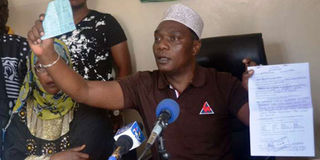MP collides with the police after cousin’s killing

Kisauni MP Rashid Bedzimba displays a postmortem report and a death certificate in his office on July 24, 2016, condemning the killing of his cousin Salim Hanjari by police last week. Mr Bedzimba defended Mr Hanjary, saying he was not a ‘wanted criminal’ as portrayed by police. PHOTO | KAZUNGU SAMUEL | NATION MEDIA GROUP
What you need to know:
- Mr Bedzimba called the killing an “assassination”. He said a post-mortem analysis showed that “the man had surrendered”.
- However, according to the police source, intelligence indicates that Mr Hanjary stopped working for the county government in January.
Controversy over the killing of a close relative of Kisauni MP Rashid Bedzimba continued Sunday, with the lawmaker calling it a “pure extrajudicial killing” as police insisted he was a terror suspect.
A police source, who requested anonymity because of the sensitivity of the matter, linked Salim Hanjary to the terror group Al-Shabaab, describing him as a returnee who had been on the run and had been offered a county job because he had reformed.
But Mr Bedzimba defended Mr Hanjary, saying he was not a "wanted criminal" as portrayed by police.
Speaking at a press conference at the Kisauni CDF office, Mr Bedzimba called the killing an “assassination”. He said a post-mortem analysis showed that “the man had surrendered”.
Said the MP: “The autopsy report indicates that he was shot five times, some in the head. This shows that the man had given in but, because the police were on a clear mission, they decided to kill him.”
'CLEAN MAN'
The report stated that Mr Hanjary was shot five times. Mr Bedzimba, who clarified that Mr Hanjary was his cousin and not a step-brother as earlier reported, said he had been working with the Mombasa County government since 2013 and called him a “clean man”.
He said: “The deceased had access to all places because he was working with the county government.
“If he was really a dangerous criminal, he would have killed the leaders he was working with. And if he was guilty of anything, why not arrest him and take him to court?”
However, according to the police source, intelligence indicates that Mr Hanjary stopped working for the county government in January.
But asked to confirm whether Mr Hanjary was working with the county at the time of his death, Mr Bedzimba only said that “he has been a supervisor and you (police) should clarify that with him but not just go ahead and kill him”.
An identification card displayed by Kisauni OCPD Walter Abondo after last week’s shooting showed that Mr Hanjary, who was killed on Thursday alongside Kibwana Ahmed Abdalla, alias Rajab, worked as an administrator officer II at the Mombasa County Assembly.
COUNTY EMPLOYEE
Richard Chacha, the county's director of communications, confirmed that, indeed, Mr Hanjary was an employee of the county until his death.
“He was a hardworking employee and interacted well with his colleagues,” said Mr Chacha. “There was no behaviour that would have made us to suspect he was a criminal.”
Mr Abondo said the suspects were with two others who escaped with bullet wounds during the 4pm shooting, and that police found three hand grenades, 17 rounds of ammunition, three liquid explosives, four plastic explosives and four bomb detonators in the house, a claim Mr Bedzimba rejected.
“If they really had explosives, why is it that they did not use them when the police raided the house?” Mr Bedzimba wondered.
“If police are saying that they were with others who escaped with bullet wounds, how then couldn’t they trace the trail of blood from the wounded suspects?”
On Sunday, Mombasa County Commissioner Maalim Mohamed sided with the police, saying Mr Hanjary was a terror suspect who was being sought by police.
Mr Mohamed said Mr Hanjary’s killing was not an extrajudicial killing by police, but it was the result of a confrontation when police raided his house.





